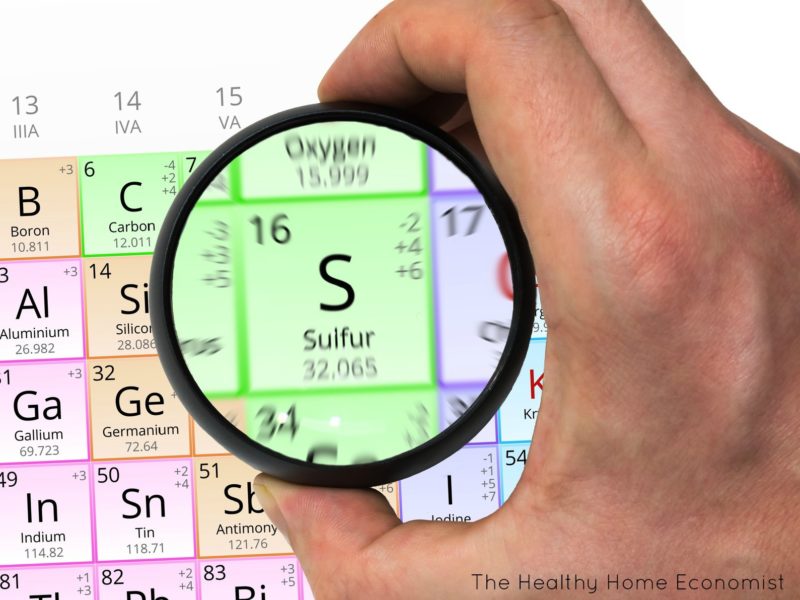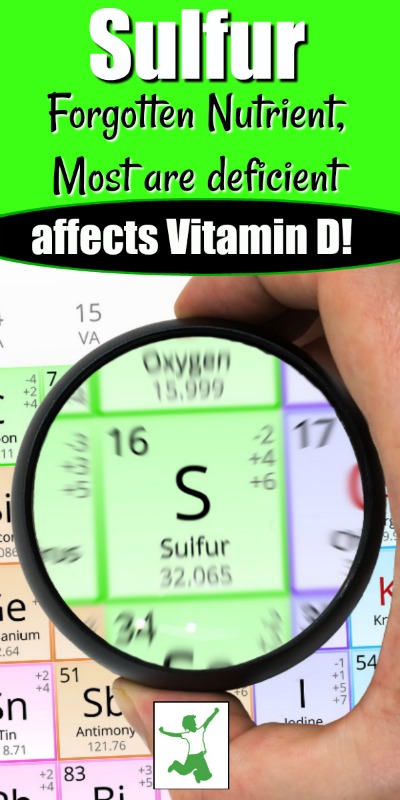
How sulfur deficiency may contribute to the inability to raise Vitamin D levels and chronic diseases like dementia. Where to get this critical nutrient naturally in whole foods to help support natural detoxification via the body’s elimination pathways.
A neighbor of mine who is in his 70’s, looks 50, and still does triathlons once told me that his mother used to make him drink well water. He hated it because it stunk to high heaven of rotten eggs! That rotten egg smell is, of course, hard water with high amounts of sulfur in it. She told him that it would boost his immune system and keep him healthy.
Smart lady.
Unfortunately, sulfur, also spelled sulphur, is all but forgotten as a critical nutrient in recent decades. Yet, this important element is very necessary for the maintenance of health. Moreover, it is important for the prevention of debilitating illnesses such as Metabolic Syndrome and perhaps Alzheimer’s.
Shockingly, a Minimum Daily Requirement (MDR) to avoid sulfur deficiency does not even exist! This despite the fact that this mineral is the eighth most common element by mass in the human body.
Countries With High Sulfur Intake Are Some of the Healthiest
The countries of Greece, Italy, and Japan are the primary suppliers of sulphur to the rest of the world. Isn’t it coincidental that these same countries enjoy some of the lowest rates of heart disease and obesity on the planet?
Perhaps not. Icelanders’ remarkably low rates of depression, obesity, diabetes, and heart disease can possibly be attributed to the country’s distinctive line of volcanoes. Periodic eruptions blanket the soil with sulphur containing volcanic rock. This enriched soil is of tremendous benefit to any plants grown or animals grazing there. In turn, people who use these plants and livestock for food enjoy greatly enhanced health.
It was once thought that the Icelandic diet was so protective against chronic illness due to a high intake of fish. This theory does not hold up, however, as Icelanders who move to Canada and continue eating a lot of fish do not continue to enjoy the same low rates of disease.
It seems that the Icelandic soil which is unusually rich in sulphur may indeed play a pivotal role in the health and avoidance of sulfur deficiency of its residents.
Sulphur’s Critical Role in the Body
Sulphur is critical to many of the body’s biological processes, metabolism included.
Without adequate sulphur, glucose metabolism becomes defective. This leads to muscle and fat cell damage as the result of becoming glucose intolerant. Over time, sulphur deficiency can lead to all manner of skeletal and muscle disorders with corresponding pain and inflammation.
This impaired glucose metabolism resulting from insufficient sulphur is also implicated as a factor in obesity and the dangerous condition known as Metabolic Syndrome. This occurs because one way the body compensates for defective glucose metabolism is by gaining weight.
When sulphur deficiency occurs within the context of a lowfat diet, the problem becomes more serious. Additional sources of glucose present in a lowfat diet in the form of carbohydrates are converted to fat. Worse, these lipids are released into the bloodstream as triglycerides to fuel damaged and inflamed muscle cells.
Alzheimer’s Disease Partly Due to Sulfur Deficiency?
Analysis of the minerals present in the cells of the typical Alzheimer’s patient reveals that sulphur is almost nonexistent compared with a normal profile.
Some research has indicated that the reversal of a serious sulphur deficiency state can prevent or halt the progression of this disease. In addition, it may potentially reverse it provided the patient is still in the early stages where little brain damage has occurred. Coconut oil for Alzheimer’s has shown promise as well.
Could the skyrocketing cases of Alzheimer’s in recent years be related to the shunning of eggs by older Americans? Eggs are an excellent source of sulfur! Yet, in adult living facilities and nursing homes, egg replacements like Egg Beaters are commonly used instead.
Sulphur Helps Mobilize Vitamin D from the Sun
When UVB rays from sunlight hit unprotected skin, they trigger a chemical reaction that converts cholesterol into vitamin D3.
Vitamin D3 is then bound to a sulfate group, forming vitamin D3 sulfate, which is soluble in water.
This water-soluble form allows vitamin D3 to be transported more easily through the bloodstream to various tissues and organs, where it can perform its essential functions, such as regulating calcium levels, supporting immune function, and maintaining bone health.
While vitamin D is fat-soluble, vitamin D3 sulfate is a form of the vitamin that is actually water-soluble. This allows it to travel freely in the blood throughout the body.
On a side note, the vitamin D3 in supplements is not the same vitamin D3 as what you get from the sun and should not be considered an adequate substitute. Except in cases of extreme deficiency, research suggests that these supplements are not helpful and can actually be harmful!
Sunlight exposed skin also produces large amounts of cholesterol sulfate, providing cholesterol levels are sufficient for this to happen.
Could undiagnosed sulfur deficiency and/or insufficient natural cholesterol in the diet be contributing to the epidemic of undiagnosed Vitamin D deficiency?

Make Sure You Get Enough to Avoid Sulphur Deficiency!
It is quite shocking that sulfur is basically ignored in nutritional circles. Nonetheless, it is a critical nutrient and one that is necessary for vibrant health and prevention of chronic disease.
One very simple way to improve the body’s sulfur status quickly is through regular Epsom salt baths. 2-3 per week soaking for 20 minutes is a sensible regimen. Epsom salt is comprised of magnesium sulfate, and both magnesium and sulfur absorb readily into the body via the skin. One caveat: Be sure to buy USP certified Epsom salts. Avoid lower quality agricultural grades.
With regard to dietary sources, another excellent way to ensure you get enough is to eat more eggs! The incredible edible egg contains high amounts of natural sulfur. Eggs also supply natural cholesterol to ensure enough is available to mobilize sulfur combined with Vitamin D in the blood. Other foods high in this element include onions, garlic, and cabbage.
Do not rely on dried fruit treated with sulfur dioxide. This is not a healthy source of sulfur!
Another caveat to note is that while certain plant foods should contain lots of sulphur, it is likely the amounts are low. Why? Sulfur rich produce is dependent upon cultivation in sulfur-rich soil.
Most soils today are depleted of this critical nutrient (unless of volcanic origin or organically treated with azomite volcanic rock dust). Thus, unless you are sure about where your vegetables are grown, relying on eggs for adequate sulfur in the diet is the decidedly better way to go!
Reference
A Possible Contributing Factor in Obesity, Heart Disease, Alzheimer’s and Chronic Fatigue








we need that sun… it is always raining and cloudy most of the day. I take D3 and calcium but yeh… its synthetic.
As far as I have researched the only supplement source for sulfur is MSM!
MSM is an incredible supplement which causes wonderful healing in peoples bodies, I have been using it for many years, it can take a person in pain from arthritis or carpel tunnel to almost pain free and flexible in only a few weeks, if they take 1/2-upto 1 TBS a couple times a day in water!
IN fact it has long been used for very expensive racehorses for it ability to heal and reduce pain and inflammation!
There is only really one or two manufactures even though you will find it under a bunch of different labels, and it comes from wood pulp, when they see the liquid coming off wood pulp it is DMSO (used topically as a spray for pain) when it drys and crystallizes they have MSM crystals!
Since sulfur is normally lost in the evaporation of foods and herbs ect. there has never before been a way to capture the sulfur to make a supplement, it just dissipates as it where!
You should be getting plenty of natural sulfur in your raw fruits and vegetables, but since most have now sat in the store and where picked long ago they end up being very low in sulfur, if there is any at all!
Try some today, even your hair will become thicker, shinny and silky in only a few weeks of you using 1/2 TBS 1 time a day in water!
For people with eye troubles, cataracts and vision problems I can post some info about its healing effects on the eyes when made into eye drops too!
i have been taking sulphur for about 2 yrs as i have fibromyalgia for past 3 yrs. It is good but dont think i am taking enough… will up it from the 2 teaspoons a day i have been havimg. how do i take it to improve my vision?
Wow good info & comments too! Anyone recommend on what brand of Epson salts?
Sulphur soap works for acne and rashes. It’s really cheap too.
Hi Sarah
I’m just wondering about something you have said in this post ….”The sun, then, has the potential to provide sulphur to the body in the form of vitamin D3 sulfate and cholesterol sulfate.”
Do have a reference for this? I’m not sure that it is 100% correct. I’m thinking that the sun encourages the binding of D3 to sulfate in the body, rather than the sun actually supplying sulfate to the body. I’m not 100% sure either but if you have a reference, I would love to read it.
Melissa
I like the sulphur hot springs you float in it.but sure stinks.also nice and warm in the winter
Here’s a great interview with Stephanie Seneff from Dr. Mercola. It’s a 7 part video. You can start by part1 : http://www.youtube.com/watch?feature=player_embedded&list=PLD1A6CE7E947EF510&v=5QUChSlUEH0
My dh used it to try and quit smoking and it was very helpful with the mood swings and cravings.
Ultimately he preferes to smoke rather than not. 🙁
My goodness, I certainly need to take time to proof messages – I do know how to spell “two”. and I do know how to punctuate. Hard to tell from this post.
In the old days we always heard about how kids were routinely given sulphur and molases in the spring as a tonic. The first of the “miracle drugs” came into play during WWII, the first ones were the Sulfa drugs, sprinkled on battle wounds. The names I heard were sulfathiazole and sulfadiazene. There was another too. We heard of these before penicillin became more popular. My father was given sulfa drugs duringt least one of his surgeries in the 40’s. My kids were also given sulfa for ordinary stuff – don’t remember if that was mainly for colds or stomach bugs or what. In any case, I think sulfa and sulphur are too different things but we were always kind of confused about them. I bring this up because of one of the earlier posts here that mentions WWII and wonder whether the writer’s mother might actually have been given sulfa and not sulphur.